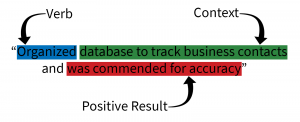Articulating Your Skills
Articulating your skills is itself an invaluable skill. It’s something you’ll make use of again and again as you progress through the modules in this course. It will help you build a resume, write a cover letter, prepare for job interviews, and more. So far you’ve taken an inventory of your skills, identified your strengths and weaknesses, and begun to consider the ways in which some of those skills might be transferable and applicable in a variety of vocations. In this part of the module, you’re going to learn how to articulate those skills in a way that makes sense to – and gets a positive response from – employers.
Simply listing your skills is helpful, but the best way to show that you have in fact developed certain skills is to prove it with evidence: You talk about a time when you put those skills to work.
The STAR Framework
Knowing how to best articulate your skills will help you throughout your career, from writing a resume, to networking effectively, to answering tough job interview questions. It begins with using the STAR framework. STAR is an acronym that stands for:
- Situation: What was the situation?
- Task: What was your task?
- Action: What action did you take?
- Result: What was the result?
Using the STAR framework ensures that you demonstrate the skills you have in a clear and focused manner. It provides an opportunity to articulate your skills and form a foundation that prepares you to answer behavioural questions during job interviews. Becoming familiar with the STAR framework will be especially useful when writing resumes, cover letters, and preparing for interviews.
 Portfolio Activity #7 – Star Framework Examples
Portfolio Activity #7 – Star Framework Examples
In the document building tool below, brainstorm a couple of examples of when you had a successful outcome in your past. Again, these can be projects you completed at work, school, or home. If you’re having trouble, take a look at these examples in which the STAR framework is utilized in an interview setting.
Accomplishment Statements
Now that you are familiar with the STAR framework, let’s talk about accomplishment statements. An accomplishment statement is your STAR story distilled down into one phrase. Here is the simple formula for an accomplishment statement:
VERB + CONTEXT + RESULT
In one phrase, an accomplishment statement explains…
- The action you took (Verb),
- Under what circumstances (Context), and
- The positive outcome (Result).
Let’s say you want an accomplishment statement to support your organization skills, accuracy, and/or database skills. You think of an example: You had to track business contacts (context), and so you organized (verb) a database, and you were commended for its accuracy (result). Your accomplishment statement could be “Organized database to track business contracts and was commended for accuracy”.

Replace all text between the “Verb/Context/Positive Result” graphic and the Portfolio Activity with this:
Here are some more examples of accomplishment statements:
- Welcomed customers in a friendly manner and provided clear directions for locating products
- Flexibly handled multiple projects at the same time, leading to improved office efficiency
- Interacted with diverse customers on a regular basis, providing personalized service
In the document builder below, we’ve made some space for you to try your hand at crafting accomplishment statements based on your own experiences. If you need to, take a look at the work you did in practicing the STAR Framework to use as inspiration for this activity.
 Portfolio Activity #8 – Writing Accomplishment Statements
Portfolio Activity #8 – Writing Accomplishment Statements
Targeting Skills For Development
Throughout this module, you have identified the employability skills you already possess, along with some that you may wish to target for further development. In the final activity for this section, you will articulate how you will begin developing the specific skills you identified. Before you get started, go back and take a look at your screenshots from the Skill Sorting activity and the O*NET skills activity. This should give you a good baseline to start selecting skills you’d like to improve.
 Portfolio Activity #9 – Skill Development Goals
Portfolio Activity #9 – Skill Development Goals
Keep your eyes open for unexpected opportunities to learn more and grow your skills. Let people know what your career goals are, and ask for suggestions. You may find opportunities in the most unlikely of places, so when someone offers a recommendation or an interesting idea crosses your path, take action!
Media Attributions
- Document File via Careerspace
- Accomplishment Statement Example via Trent Online

